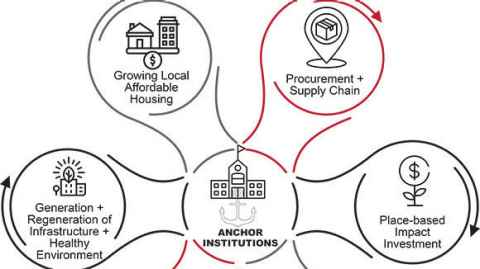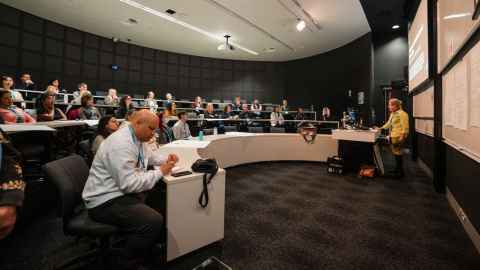'Sexy spending': University and social procurement
18 July 2024
Opinion: 'Don’t make it so hard' was a key take-out from a recent workshop covering the potential for impactful purchasing at the University, writes Nikki Mandow.

Social (or sustainable) procurement is a movement gaining traction worldwide, including at universities in Australia, North America and Europe. It involves organisations using their purchasing power to generate value over and above the cost of the goods, services or works being procured.
Social procurement was the topic of conversation at a 'Sexy Spending' workshop at Aspire, a University of Auckland professional staff conference. In workshops facilitated by Nikki Mandow and Nina Mamnani from the University, participants discussed ways to harness some of the $450 million or so of annual University of Auckland operational spending to make a social, environmental, economic or cultural difference in the world.
While value for money has traditionally been the key driver for procurement at big organisations, ‘social procurement’ extends the meaning of ‘value’ to include broader benefits and outcomes.
It might be buying the food for a departmental function from a company owned by refugees or women or students. It could be giving part of a construction contract to a Māori or Pacific-owned business. Or ensuring suppliers have environmental performance goals and are cutting their carbon emissions.

Sustainable procurement is already happening in small pockets at the University, workshop attendees said. Take the purchase of traditional fans intended for Chinese visitors. Instead of buying cheap fans from an overseas supplier, one department found a designer who accessed Māori patterns from a local company. The small company is now on the University's supplier list.
In another case, the Pacific Studies team used its own network – and staff donations – to commission a carving from a local artist as a leaving present for a colleague. The alternative was buying from a bigger and less culturally appropriate supplier.
But on the whole, workshop participants felt the procurement structure at University made it difficult, if not impossible, to buy from social enterprises or smaller companies outside the preferred supplier list. And that was a shame – and not just for the communities and businesses that might benefit from being part of an expanded supply chain.

Attendees discussed how flexibility could have a number of benefits for the university itself. For example, being able to talk about social procurement policies and initiatives would be good for the University’s profile and reputational value as it competes with international universities (many of which are adopting social procurement practices) and looks for success in global rankings. In addition, a more diverse supply chain would better reflect the diversity of staff and students.
Working with more Māori-owned businesses could be a visible sign of the university working towards its Te Tiriti obligations, and there is also a potentially powerful boost for staff and students from working with community companies and groups that make a difference.
“There was a strong feeling of ‘do good, feel good’ from participants,” workshop co-presenter Nina Mamnani says.
“There was also huge support for having more University of Auckland students and alumni on supplier lists and making processes much easier.”
Including social or environmental impacts as part of the procurement process at the University need not be as daunting as it might appear.
Social enterprise cleaning company Fresh Desk pays its diverse staff the living wage, encourages them to gain qualifications, and uses only environmentally-friendly cleaning products. Speaking via a video link, co-founders Caroline de Castro and Nicole Oxenbridge encouraged the UoA participants to “start their social impact journey”.
“Students are thinking about what kind of impact their university is driving, be it social or environmental impact. It’s important.”
Meanwhile, workshop co-presenter Nikki Mandow says there’s an alignment between potential social procurement outcomes and the university’s commitment to the United Nations Sustainable Development Goals. For example, buying from a wider group of suppliers, including those from indigenous, minority or disadvantaged groups, ties up with Sustainable Development Goal 10 - Reduced Inequalities. And using suppliers which are committed to reducing greenhouse gas emissions links with SDG 13 - Climate Action.
“Manaakitanga has different shapes,” one workshop group wrote. Manaakitanga (hospitality, kindness, generosity) is one of the University of Auckland’s stated values.
Several groups said it would be good to see the university encouraging existing suppliers to take on social initiatives and committing to environmental best practice. It would also be good to see student-led businesses or initiatives being valued within the supply chain.
The Pacific Studies team used its own network – and staff donations – to commission a carving from a local artist as a leaving present for a colleague. The alternative was buying from a bigger and less culturally appropriate supplier.
But one of the most effective moves would be allowing more flexibility within the procurement system, participants said.
“The University’s own procurement documents state that ‘Procurement supports the University’s mission to be an organisation that creates globally transformative impacts through its distinctive strengths in world-leading research, scholarship, teaching and collaborative partnerships,” Nikki said. “A strong message from participants was they would like to play a part in that.”
Murray Bays joined the university as Head of Strategic Procurement earlier this year and took part in one of the ASPIRE workshops.
He says including social or environmental impacts as part of the University's procurement process “need not be as daunting as it might appear”.
“While spend-management requirements exist to safeguard our organisation and optimise available funds, they also provide opportunities for positive impact.”
He says his team is actively exploring how to get greater visibility into present and prospective suppliers’ sustainability credentials.
“By implementing new systems and technology, we will be able to establish ESG [environmental, social, governance] credentials and track supplier performance more effectively. This data-driven approach will ensure that our procurement decisions both align with and enhance our organisation’s environmental and social mission.”
Media enquiries
Nikki Mandow
Email: nikki.mandow@auckland.ac.nz